ASCIA Reports
ASCIA Strategic Plan 2024-2028 and ASCIA Priorities Report 2023 | ASCIA Reports - National Allergy Council Shared Care for Allergy Project | ASCIA Reports - National Allergy Council Schools and Childcare Project | ASCIA AGM Minutes, Annual Reports, Highlights, Financial Reports | ASCIA Scope of Practice documents | National Allergy Council | ASCIA/NPS Choosing Wisely Australia and RACP Evolve recommendations | Allergy in Australia 2014 | Allergy and Immune Diseases in Australia (AIDA) Report 2013 | ASCIA Education Resources Report 2013 | Economic Impact of Allergies Report 2007
ASCIA Strategic Plan 2024-2028
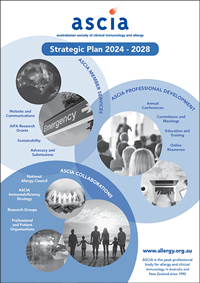 ASCIA's purpose is to advance the science and practice of allergy and clinical immunology. This is achieved by promoting the highest standard of medical practice, training, education and research, to improve the quality of life and health of people with immune system disorders, including allergies, immunodeficiencies and other immune diseases.
ASCIA's purpose is to advance the science and practice of allergy and clinical immunology. This is achieved by promoting the highest standard of medical practice, training, education and research, to improve the quality of life and health of people with immune system disorders, including allergies, immunodeficiencies and other immune diseases.
![]() ASCIA Strategic Plan 2024-2028603.26 KB
ASCIA Strategic Plan 2024-2028603.26 KB
In recent years ASCIA has worked on developing Strategies for Allergy and Immunodeficiency, which are now being implemented. These collaborations will be a major focus for ASCIA in the next few years. To ensure that ASCIA can plan for the future, this new ASCIA Strategic Plan has been developed, based on:
- ASCIA’s Purpose, Strategic Areas of Focus and Priorities within these areas
- Findings from the ASCIA Priorities Report 2022-2023
- National Allergy Council projects assigned to ASCIA
- ASCIA Immunodeficiency Strategy for Australia and New Zealand
ASCIA Priorities Report 2023
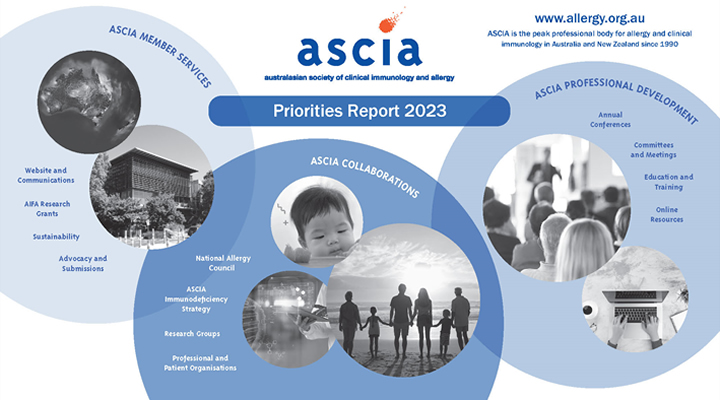 ASCIA works towards achieving its purpose by undertaking a wide range of initiatives that are prioritised and are listed at https://www.allergy.org.au/about-ascia/ascia-initiatives
ASCIA works towards achieving its purpose by undertaking a wide range of initiatives that are prioritised and are listed at https://www.allergy.org.au/about-ascia/ascia-initiatives
The ASCIA Priorities Report 2023 is based on the results from the ASCIA Member Survey which was conducted from November 2022 to January 2023. ASCIA undertook to survey the membership to ensure alignment of the ASCIA priorities with member needs. Uptake of the survey was 40% which attests to the enthusiasm and engagement of ASCIA members.
![]() ASCIA Priorities Report 20231.92 MB
ASCIA Priorities Report 20231.92 MB
ASCIA Reports - National Allergy Council Shared Care for Allergy Project
Report - ASCIA Participation in Medical Conferences 2024
In 2024 ASCIA participated through exhibition stands at 12 medical conferences, with more than 14,000 delegates, to promote evidence-based online anaphylaxis and allergy courses and resources, as part of the National Allergy Council Shared Care for Allergy Project. Read the report here
![]() ASCIA REPORT MEDICAL CONFERENCE PARTICIPATION 2024 172.30 KB
ASCIA REPORT MEDICAL CONFERENCE PARTICIPATION 2024 172.30 KB
Evaluation Reports - ASCIA Anaphylaxis and Allergy Training for Health Professionals
Evaluation reports based on 14,011 completions for ASCIA anaphylaxis and allergy e-training courses for health professionals are available below. This represents an increase of 150% compared to 5,589 course completions in 2023, including health professionals in rural, regional or remote (RRR) areas:
- 9,489 health professional anaphylaxis course completions (31% in RRR areas) - a 139% increase compared to 3,971 course and survey completions in 2023.
- 3,170 health professional anaphylaxis refresher course completions (34% in RRR areas) - a 392% increase compared to 806 course and survey completions in 2023.
-
1,352 health professional allergy course completions (29% in RRR areas) - a 40% increase compared to 812 course and survey completions in 2023.
The large increase in course completions is due to promotion of the courses by ASCIA, through conferences, e-newsletters and social media, as part of the National Allergy Council Shared Care for Allergy project.
Whilst the overall feedback was positive, the information provided in these reports will guide future developments and improvements to ASCIA online training and resources, which is outlined under "ASCIA Actions in Response to Feedback" on the final page in each report.
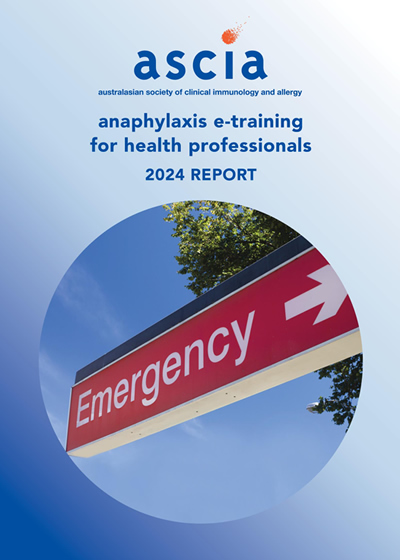
![]() ASCIA Anaphylaxis e-training HP Report 2024501.13 KB
ASCIA Anaphylaxis e-training HP Report 2024501.13 KB
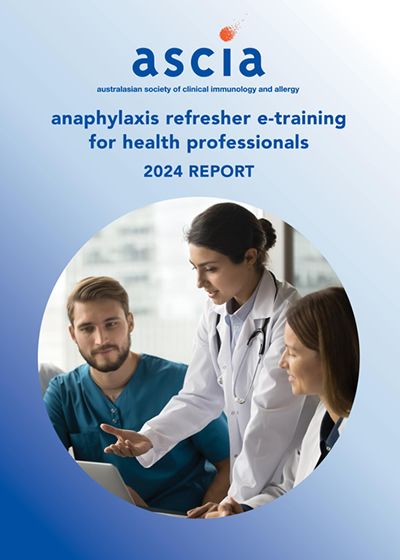
![]() ASCIA Anaphylaxis refresher e-training HP Report 2024487.54 KB
ASCIA Anaphylaxis refresher e-training HP Report 2024487.54 KB
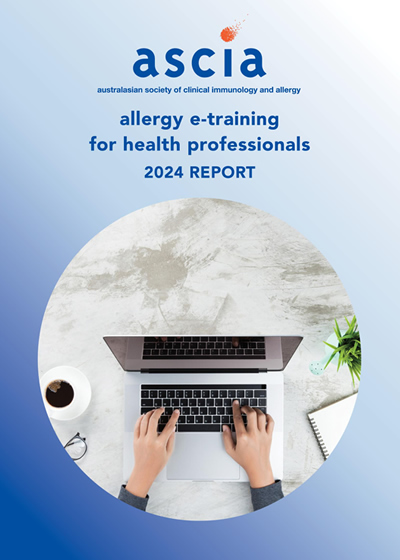
![]() ASCIA Allergy e-training HP Report 2024558.36 KB
ASCIA Allergy e-training HP Report 2024558.36 KB
ASCIA Reports - National Allergy Council Schools and Childcare Project
Evaluation Reports - ASCIA Anaphylaxis Training for Schools, Childrens Education/Care (CEC) and Community
Evaluation reports based on 110,216 feedback surveys from 2024 ASCIA anaphylaxis e-training course completions for schools, children's education/care (CEC) and community are available below. This represents an increase compared to 2023, including in rural, regional or remote (RRR) areas:
- 87,580 school anaphylaxis course completions (30% in RRR areas) - an increase of 19% compared to 74,201 course completions in 2023*
- 14,318 children's education/care (CEC) anaphylaxis course completions (28% in RRR areas) - an increase of 57% compared to 9,133 course completions in 2023
- 4,621 schools, CEC and community anaphylaxis refresher course completions (33% in RRR areas)- an increase of 30% compared to 3,568 course completions in 2023
- 2,816 first aid (community) anaphylaxis course completions (41% in RRR areas) an increase of 12% compared to 2,514 course completions in 2023
*Course completions in 2024 are in addition to completions of ASCIA anaphylaxis e-training courses licenced by NSW, QLD and WA Education Departments for use on their LMS platforms.
The large increasesin course completions are due to promotion of the course by ASCIA, through conferences, e-newsletters and social media, as part of the National Allergy Council Schools and Childcare project.
Whilst the overall feedback was positive, the information provided in these reports will guide future developments and improvements to ASCIA online training and resources, which is outlined under "ASCIA Actions in Response to Feedback" on the final page in each report.
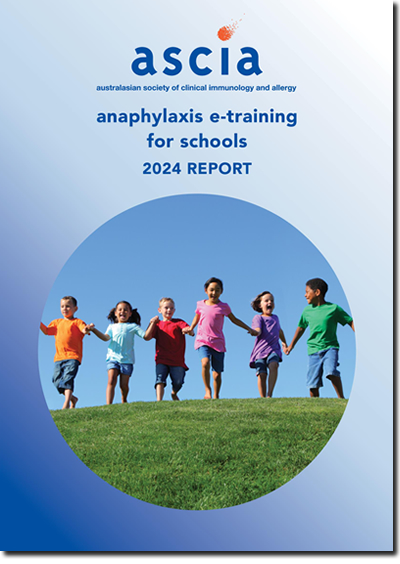
![]() ASCIA Anaphylaxis e-training Schools Report 2024908.69 KB
ASCIA Anaphylaxis e-training Schools Report 2024908.69 KB
This report (Schools version) is based on mandatory feedback surveys conducted in 2024
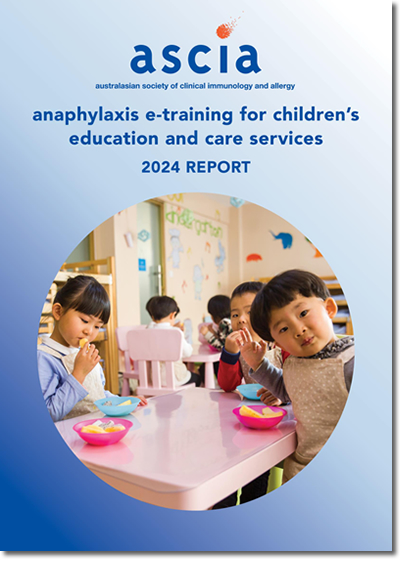
![]() ASCIA Anaphylaxis e-training Childrens Education Care Report 2024528.65 KB
ASCIA Anaphylaxis e-training Childrens Education Care Report 2024528.65 KB
This report (Children’s Education and Care version) is based on mandatory feedback surveys conducted in 2024
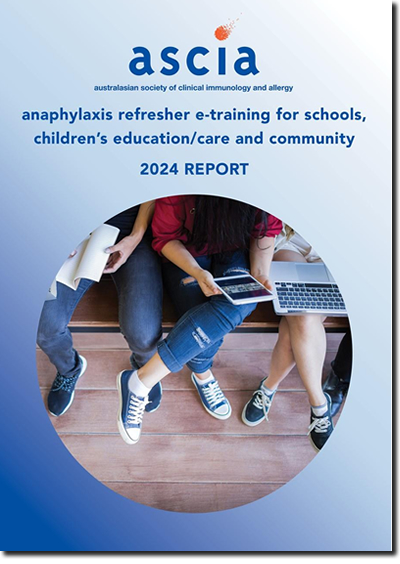
![]() ASCIA Anaphylaxis Refresher e-training Report 2024514.52 KB
ASCIA Anaphylaxis Refresher e-training Report 2024514.52 KB
This report (Short Refresher version) is based on mandatory feedback surveys conducted in 2024

![]() ASCIA Anaphylaxis e-training First Aid Community Report 2024514.52 KB
ASCIA Anaphylaxis e-training First Aid Community Report 2024514.52 KB
This report (First Aid (community) is based on mandatory feedback surveys conducted in 2024
ASCIA Immunodeficiency Strategy
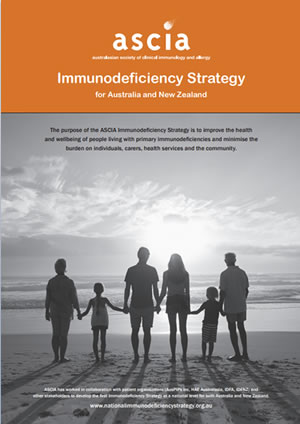 The ASCIA Immunodeficiency Strategy for Australia and New Zealand meeting was held on Friday 28th April, to coincide with World Primary Immunodeficiency Week 2023. The meeting was attended by a range of stakeholders including clinicians (clinical immunologists, specialist nurses and allied health), patient/carer organisations (AusPIPs, IDFA and IDFNZ), and researchers. The meeting was supported by ASCIA and an unrestricted educational grant from CSL Behring. As a result of this meeting a list of proposed prioritised actions was developed which are outlined at https://www.allergy.org.au/about-ascia/info-updates/outcomes-from-ascia-immunodeficiency-strategy-meeting
The ASCIA Immunodeficiency Strategy for Australia and New Zealand meeting was held on Friday 28th April, to coincide with World Primary Immunodeficiency Week 2023. The meeting was attended by a range of stakeholders including clinicians (clinical immunologists, specialist nurses and allied health), patient/carer organisations (AusPIPs, IDFA and IDFNZ), and researchers. The meeting was supported by ASCIA and an unrestricted educational grant from CSL Behring. As a result of this meeting a list of proposed prioritised actions was developed which are outlined at https://www.allergy.org.au/about-ascia/info-updates/outcomes-from-ascia-immunodeficiency-strategy-meeting
ASCIA AGM Minutes, Annual Reports, Highlights, Financial Reports
ASCIA Annual General Meeting (AGM) Minutes www.allergy.org.au/members/ascia-agm
ASCIA Annual Reports www.allergy.org.au/members/ascia-annual-reports
ASCIA Annual Highlights www.allergy.org.au/about-ascia/highlights
ASCIA Annual Financial Reports - available on the Australian Charities and Not-for-profits Commission (ACNC) website
ASCIA Scope of Practice documents
Scope of Practice - Allergy Skin Testing in Australia 2018
ASCIA developed this Scope of Practice in response to the Medicare Benefits Schedule (MBS) item number changes implemented by the MBS Review Taskforce, effective 1 November 2018. Whilst these changes were not initiated by ASCIA, the previously proposed item numbers were significantly modified in response to a submission made by ASCIA in July 2017, to ensure patients with complex allergic disease are not disadvantaged.
![]() ASCIA Scope of Practice - Allergy Skin Testing in Australia 2018171.23 KB
ASCIA Scope of Practice - Allergy Skin Testing in Australia 2018171.23 KB
Scope of Practice - Specialist Physicians in Immunology and Allergy in Australia 2014
The aim of this Scope of Practice is to outline the range of practice of clinical immunology/allergy specialists in Australia and ensure that patients with allergic and other immune diseases receive the highest standard of care, in line with best clinical practice.
![]() ASCIA Scope of Practice Australia July 2014208.16 KB
ASCIA Scope of Practice Australia July 2014208.16 KB
National Allergy Council
From 2014 to 2015 ASCIA developed the National Allergy Strategy, in partnership with Allergy & Anaphylaxis Australia (A&AA), which continues to be implemented through the National Allergy Council. The Strategy document is available at https://nationalallergycouncil.org.au/about-us/our-strategy
The National Allergy Council is a partnership between ASCIA and Allergy & Anaphylaxis Australia working in collaboration with other stakeholders.
ASCIA Recommendations - NPS Choosing Wisely Australia and RACP Evolve
ASCIA was the first Specialty Society affiliated with the Royal Australasian College of Physicians (RACP) to be involved in Choosing Wisely Australia, a health profession led initiative faciliated by National Prescribing Service (PBS) MedicineWise and the RACP Evolve program. The ASCIA list of five things that clinicians and consumers should question is available at:
www.choosingwisely.org.au/recommendations/ascia
https://evolve.edu.au/recommendations/ASCIA
For further information about Choosing Wisely Australia go to www.choosingwisely.org.au
For further information about the RACP Evolve program go to https://evolve.edu.au/about
Allergy in Australia 2014
Prior to ASCIA developing a National Allergy Strategy for Australia, the following report was developed in 2014.
Allergy and Immune Diseases in Australia (AIDA) Report 2013
The AIDA report on allergy and other immune diseases (immunodeficiency and autoimmune diseases) was developed in 2013.
![]() Allergy and Immune Diseases in Australia (AIDA) Report 2013720.33 KB
Allergy and Immune Diseases in Australia (AIDA) Report 2013720.33 KB
ASCIA Education Resources Report 2013
ASCIA has been developing web based education resources since 1999. In 2013, the ASCIA Education Resouces Report was developed to outline the large range of web based educational resources that are all available at no charge on the ASCIA website.
![]() ASCIA_Education_Report_July_2013483.57 KB
ASCIA_Education_Report_July_2013483.57 KB
Economic Impact of Allergies Report 2007
The cost of allergies to the Australian economy is estimated to be $7.8 billion, with lost productivity and health system expenditure the major contributing factors. Furthermore, most Australians with allergies face a wait many months to see a specialist, if they can access care at all. These are among key findings in the following report 'Economic Impact of Allergies' by Access Economics that was released by ASCIA in November 2007. An updated report is being developed in 2025.
![]() Economic Impact of Allergies Report - 20071.65 MB
Economic Impact of Allergies Report - 20071.65 MB
Content updated May 2025
